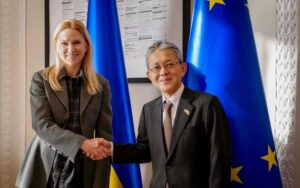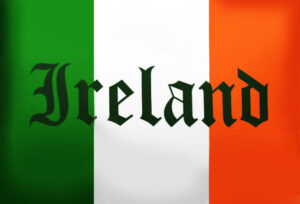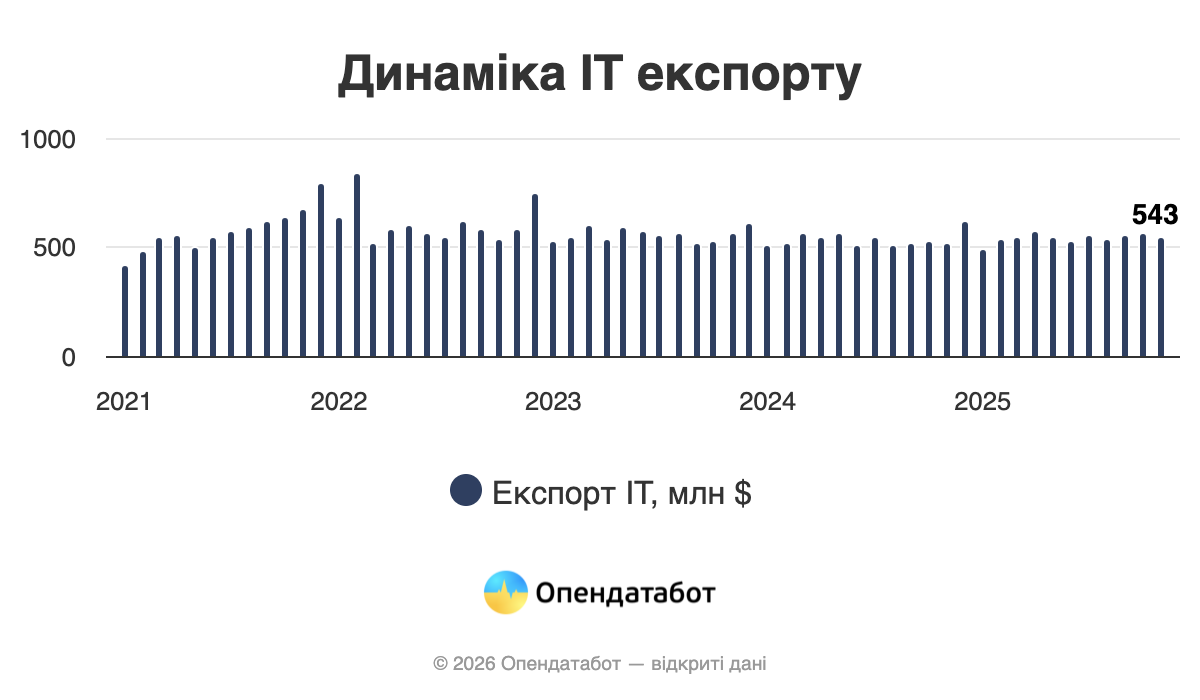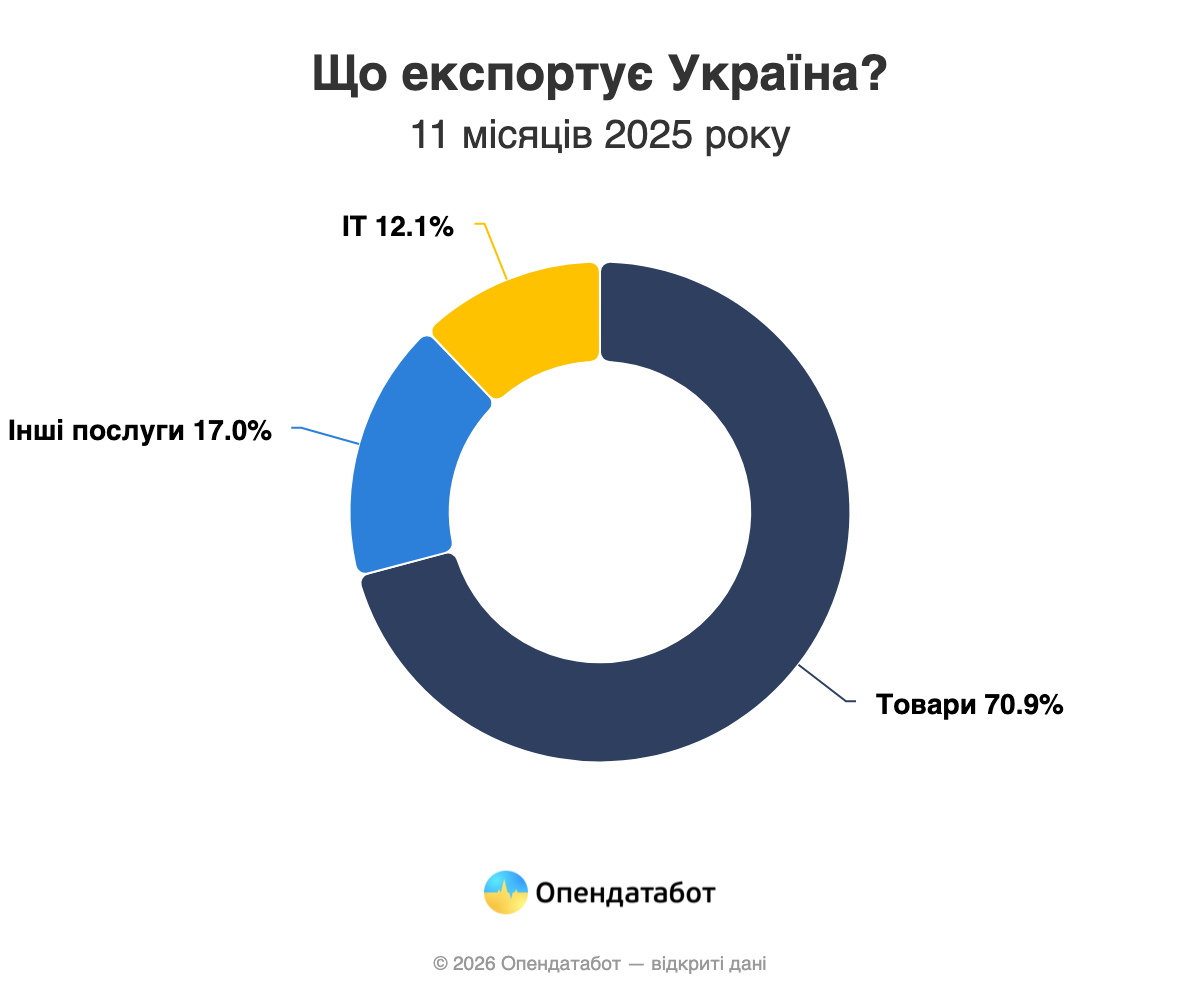
In 2026, Ukraine will receive $6 billion from the Japanese government for humanitarian and technical support, according to Deputy Speaker of the Verkhovna Rada Olena Kondratiuk.
“The Rada at our first official meeting with Japanese Ambassador to Ukraine Masashi Nakagome… Japan has already provided Ukraine with more than 2,500 electric generators of various capacities, more than 65 transformers and 10 electric generator sets, and other critical equipment to support and restore the power system,” she wrote on her Facebook page on Wednesday.
Kondratyuk also expressed gratitude for the allocation of approximately $149 million in the supplementary budget approved by the Japanese parliament at the end of 2025 for projects under the Emergency Recovery Program for Ukraine.
She noted that Japan’s total financial and humanitarian assistance has already exceeded $15 billion.
In addition, Japan is assisting with the rehabilitation of Ukrainian military personnel, has joined the International Coalition for the Return of Ukrainian Children, and has voted in favor of recent pro-Ukrainian resolutions at the UN. In particular, Japan co-authored and supported the resolution “Return of Ukrainian Children.”
“It is important that Japan, as a G7 country, is putting sanctions pressure on Russia and supporting the prosecution of the aggressor country. This includes through the mechanism of the Special International Tribunal. I am convinced that only joint sanctions by all G7 countries, including the US and Europe, can force Russia to engage in peace talks,” Kondratyuk added.
As for the meeting itself, the parties discussed interparliamentary cooperation and the situation with the announcement of early parliamentary elections in Japan, which are scheduled for February 8, 2026.
In turn, Ambassador Masashi Nakagome noted that the vast majority of Japan’s key political forces support Ukraine. According to him, Japan will continue to provide financial and humanitarian assistance to Ukraine.

This article presents key macroeconomic indicators of Ukraine and the global economy as of the end of August 2025. The analysis was prepared based on the latest data from the State Statistics Service of Ukraine (SSSU), the National Bank of Ukraine (NBU), the International Monetary Fund (IMF), the World Bank, as well as leading national statistical agencies (Eurostat, BEA, NBS, ONS, TurkStat, IBGE). Maksym Urakin, Director of Marketing and Development at Interfax Ukraine, PhD in Economics and founder of the Experts Club Information and Analytical Center, presented an overview of current macroeconomic trends.
Macroeconomic indicators of Ukraine
For Ukraine, the first eight months of 2025 were characterized by the logic of “managed stability”: the economy remained efficient and gradually adapted to military restrictions, but without a qualitative leap in investment. In its review, the NBU noted that in the first half of the year, the economy grew by about 1% quarterly (Q/Q), meaning that the recovery continued but remained moderate.
“In January-August 2025, the key signal is not ”high rates” but the ability of the economy to operate under constant risks. We see a gradual recovery in demand and service sectors, but the investment component is still weak: businesses often choose to repair and replace rather than expand. This means that growth is not yet translating into modernization. The strategic task is to transfer external support and financial stability into long-term projects: energy, logistics, processing, defense technologies,” explains Maksym Urakin.
The inflationary background in the summer of 2025 showed a gradual easing. According to the State Statistics Service, in August 2025, consumer prices decreased by 0.2% mom, and annual inflation (up to August 2024) was 13.2%. Core inflation was estimated at 11.4% yoy; the consumer price index for January-August (to December of the previous year) was +6.0%.
Monetary policy in this period remained tight but predictable: The NBU kept the key policy rate at 15.5%, emphasizing the importance of consolidating the disinflationary trend and controlling expectations. The discussion materials of the NBU Monetary Policy Committee explicitly state the logic behind the rate and the role of interest rate policy in reducing pressure on the foreign exchange market and reserves.
“Inflation in 2025 is not only a monetary story, but also a supply-side story: weather, harvests, logistics, energy restrictions, and the import component. That is why the 15.5% rate is more of a “confidence anchor” than a tool for accelerating growth. The NBU’s task is to prevent expectations from being inflated and people from fleeing to the currency, especially when the trade balance is weak. But at the same time, the government must do its part: stimulate production and competition, otherwise inflationary pressure will return in waves,” emphasizes Maxim Urakin.
Foreign trade remained one of the main channels of macro risks. According to the State Statistics Service, in January-April 2025, exports of goods amounted to $13.31 billion (93.1% compared to the same period in 2024), while imports amounted to $24.82 billion (112.6%). This reflected a persistent gap between the need for imports (energy, equipment, critical goods) and export opportunities.
International reserves were a critical compensator for trade tensions and military risks. According to the NBU, as of September 1, 2025, the reserves amounted to $46.03 billion, and in August they increased by 7.0%, primarily due to significant receipts from international partners and lower net sales of foreign currency by the NBU.
The debt burden remained high. Public reviews based on the data of the Ministry of Finance stated that as of August 31, 2025, public and publicly guaranteed debt reached about UAH 7.95 trillion (≈ $192.7 billion). Additionally, the specialized resource of the Verkhovna Rada estimated the public debt as of 08/31/2025 at UAH 7.6572 trillion.
Global economy
In 2025, the global economy was on a low but relatively steady growth trajectory, with different speeds across regions and sensitivity to trade risks and financial conditions.
In the World Economic Outlook update (July 2025), the IMF forecast global growth of 3.0% in 2025 and 3.1% in 2026, explaining the revision by better financial conditions and temporary “lead effects” in trade.
At the same time, the World Bank in its Global Economic Prospects (June 2025) estimated that the global economy is “consolidating” at a lower rate of about 2.7% in 2025-2026.
“Global growth in 2025 looks like a balance between resilience and vulnerability: financial conditions have become a little softer, but structural risks – protectionism, energy shocks, debt – have not disappeared. The US is supporting global demand, but remains sensitive to rates and the consumption cycle; Europe is adding slowly; China is keeping up the pace through industry and exports, but domestic demand is recovering unevenly. For Ukraine, this means that we should not rely on “strong external markets” alone. We need high value-added niches where we can be competitive even in a world of slow growth,” says Maksym Urakin.
The U.S. Bureau of Economic Analysis (BEA) reported that in the second quarter of 2025, U.S. real GDP grew by 3.0% at an annualized rate (advance estimate). Among the key factors, the BEA cited a decline in imports and an increase in consumer spending (partially offset by a decline in investment and exports).
Eurozone/EU. According to Eurostat’s preliminary flash estimate, in the second quarter of 2025, seasonally adjusted GDP increased by 0.1% qoq in the euro area and by 0.2% qoq in the EU. This reflected a very moderate recovery in economic activity compared to the previous quarter.
China. According to preliminary estimates released by the National Bureau of Statistics of China, the country’s GDP grew by 5.3% yoy in the first half of 2025, and by 5.2% yoy in the second quarter of 2025. Thus, China maintained its growth rate above 5% on an annualized basis.
India. According to the official press release (PIB), India’s real GDP in the first quarter of fiscal year 2025-26 (April-June 2025) was estimated at +7.8% yoy. The indicator confirmed India’s high dynamics against the backdrop of generally moderate global growth.
Turkey. TurkStat reported that Turkey’s GDP grew by 4.8% yoy in the second quarter of 2025 (according to the chained volume index). This meant an acceleration of annual growth compared to previous quarters, although the structure of demand and foreign trade factors remained important for assessing sustainability.
Conclusion.
For Ukraine, January-August 2025 was a period of relative macrofinancial manageability: inflation slowed to 13.2% yoy in August, reserves grew to $46.03 billion as of September 1, and monetary policy remained tight, keeping the key policy rate at 15.5%. At the same time, the trade imbalance and high debt burden continue to pose medium-term risks that can be mitigated not by “stabilization” but only by structural changes – investment, productivity, processing, and higher value-added exports.
“The end of August 2025 shows an important thing: financial stability in Ukraine is holding, but it does not yet guarantee an economic breakthrough. Reserves and international support are a time resource that must be converted into production and infrastructure, not just “plugging the gaps” with imports. If we do not increase our export capacity and domestic investment, external shocks will again become decisive. There is a window of opportunity, but it is measured in years, not months,” summarized Maksym Urakin.
https://interfax.com.ua/news/projects/1136991.html

On January 1, 2026, a number of changes came into force in Ukraine that affect companies’ expenses, tax burdens, and foreign trade operations—from new state budget parameters and individual tax innovations to updates to energy tariffs and export licensing rules, according to the Experts Club information and analytical center.
The 2026 state budget has set new social standards that directly affect the wage fund, social security contributions, and the calculation of fines and mandatory payments linked to the minimum wage and subsistence minimum.
In terms of taxation, businesses should take into account the updated indicators for the simplified system and military tax. The tax service’s explanations for 2026 separately note the amounts of payments for individual entrepreneurs in groups 1-2, as well as the introduction/application of the military levy for single tax payers (in particular, a fixed payment for groups 1-2 and a percentage of income for group 3), plus a number of related administrative changes.
A separate section is devoted to labor regulation. Starting in 2026, the requirements for employers regarding the employment of people with disabilities will be updated (a change in the approach to meeting the quota and financial responsibility for non-compliance). This affects personnel policy, budgeting, and internal HR procedures, especially in companies with a large number of employees.
In foreign trade for 2026, the government has maintained zero quotas (a ban through quotas) on exports of natural gas of Ukrainian origin and a number of other items, while canceling quotas on exports of table salt and coking coal, and maintaining the licensing regime for certain agricultural items for export to a number of EU countries.
In the energy sector, the NEURC set the tariff for Ukrenergo’s electricity transmission services for 2026: for January-March – UAH 713.68/MWh (excluding VAT) for most system users and UAH 373.93/MWh (excluding VAT) for green electrometallurgy enterprises; for April-December – UAH 742.91/MWh and UAH 378.49/MWh, respectively (excluding VAT).
Changes in excise and financial matters are also important for certain industries. In particular, the schedule for increasing excise duty on motor fuel, previously introduced by amendments to the Tax Code, continues to apply, and an increased income tax rate has been set for banks for 2026.

The winner of the tender to conclude a production sharing agreement (PSA) for the extraction and enrichment of metal minerals within the Dobra lithium deposit (Kirovograd region), will be a consortium led by the Irish company TechMet (Dublin), according to The New York Times, citing two anonymous members of the PSA commission.
“Although (the decision) requires formal approval by the Ukrainian Cabinet of Ministers, officials said the agreement is essentially a done deal,” the newspaper writes.
Interfax-Ukraine has not yet been able to obtain official comment on this information from the Interdepartmental Commission for the Conclusion and Implementation of PSAs, which is headed by Minister of Economy, Ecology, and Agriculture Oleksiy Sobolev.
The agency also contacted the second participant in the tender, European Lithium Ukraine LLC, which, through the Australian company European Lithium Ltd, is a sister company of the American company Critical Metals Corp (CRML), but at this stage, they declined to comment on the NYT information.
The publication notes that the winning consortium has close ties to the administration of US President Donald Trump, as it includes Ronald S. Lauder, a friend of the US president and heir to the Estée Lauder cosmetics company, whom Trump has known since his college days.
TechMet’s largest shareholder is the US International Development Finance Corporation (DFC).
The NYT claims, citing a member of the PPP commission, that the consortium’s proposal is significantly better than the minimum investment of $179 million required by the terms of the tender.
As reported, the opening of the envelopes of the participants in the tender announced in September took place on December 15, 2025. Subsequently, the URPP commission had five days to check the submitted applications for completeness and, by January 12, 2026, to provide the government with substantiated proposals for determining the winner of the tender.
CRML, which is listed on the Nasdaq stock exchange under the ticker symbol “CRML,” announced its bid for the tender. positions itself as a leading mining development company specializing in critical metals and minerals, as well as producing strategic products necessary for electrification and next-generation technologies for Europe and its Western partners. According to the company, its flagship Tanbreez project, located in southern Greenland, is one of the world’s largest rare earth element deposits.
European Lithium, listed on the Australian Stock Exchange under the ticker symbol “EUR,” is a mining company engaged in the exploration and development of lithium, rare earth, precious, and base metal deposits. Its stated markets are Austria, Ireland, Ukraine, and Australia. According to information on the company’s website, it wholly owns the Wolfsberg lithium project located in Carinthia, Austria.
CRML had previously claimed its rights to the Dobra site, linking them to the transfer of assets from European Lithium, which in turn had acquired these rights from the Ukrainian company Petro-Consulting LLC.
In mid-June 2025, when he was head of the Office of the President, Andriy Yermak stated that the development of the Dobra lithium deposit could become the first pilot project within the framework of cooperation with the US.
As for the mining investment company TechMet, one of whose largest investors is the US government through the DFC, it announced in July 2025 its interest in participating in this competition and, if successful, building processing facilities with investments of more than $0.5 billion. In September, a DFC delegation accompanied by Ukrainian Ministry of Economy officials visited the Kirovograd region.
Earlier in 2025, TechMet CEO Brian Mennell reported that the company was part of a consortium interested in developing the potentially large-scale Dobra lithium deposit in Ukraine under a production sharing agreement. According to him, TechMet has been evaluating the Dobra project since 2023.
TechMet, according to information on its website, owns controlling or dominant minority stakes in 10 critical mineral assets on four continents. The U.S. international development finance corporation DFC is a significant shareholder in TechMet. “TechMet’s investment approach supports the broader policy goals of the U.S. government and its allies,” the website notes.
In addition, TechMet-Mercuria has been established as a joint venture with Mercuria, which is also a major shareholder in TechMet on a 50:50 basis. This is a physical supply chain management platform focused on marketing, trading, logistics, and risk management services for the range of technology metals that TechMet works with.
TechMet’s representative in Ukraine, Vladimir Ignashchenko, was vice president of the Ukrainian State Credit and Investment Company in the late 1990s, then deputy head of the Ministry of Natural Resources and the Ministry of Economy, in 2010-2011, he was first deputy head of the Ministry of Natural Resources when the ministry was headed by Nikolai Zlochevsky, and then advisor to Minister Eduard Stavitsky and Minister of Energy Igor Nasalik.
His son, Taras Ignashchenko, was for some time the director of Petro-Consulting (later renamed European Lithium Ukraine), which fought for the Shevchenkivske lithium deposit in Donetsk Oblast, now occupied by Russian aggressors, and the Dobra deposit.
The tender for the conclusion of a PSA for the Dobra lithium deposit was announced with the aim of exploring, extracting, and enriching lithium, niobium, rubidium, tantalum, cesium, beryllium, tungsten, and gold for a period of 50 years. The minimum investment for geological exploration is the equivalent of $12 million, and for the organization of mining and enrichment of lithium-containing minerals and other metal minerals – $167 million, but the final obligations are determined by the results of the tender.
The total area of the site is 17.07 square kilometers, and the deadline for submitting applications for participation in the tender is December 12, 2025. The participation fee is UAH 0.5 million.
According to the terms and conditions, the maximum share of compensation production, through which the investor is compensated for its expenses, is 70% of the total volume of production until the investor’s expenses are fully reimbursed, while the state’s share in profitable production must be at least 4-6%.
It is noted that the reserves and resources of lithium ores in the area were approved by decisions at the end of 2017 and in 2018 in the amount of 1 million 218.14 thousand tons (average Li2O content 1.37%) and P2 – 70.6 thousand tons (average Li2O content 1.43%).
Separately, the State Commission of Ukraine on Mineral Reserves (SCM) noted the presence of promising and forecast resources of associated useful components (P1+P2) in the lithium ores of the Dobra site: Ta2O5 – 4.75 thousand tons; Nb2O5 – 8.24 thousand tons; Rb2O5 – 104.07 thousand tons; BeO – 22.08 thousand tons; SnO2 – 4.46 thousand tons and Cs2O – 7.97 thousand tons.
The winner of the tender must ensure geological exploration of the subsoil and conduct an international audit of reserves at the site within two and a half years, as well as submit materials to the State Geological Committee on the assessment of lithium and other metal mineral reserves for approval.
After the conclusion of the PSA, the investor will be required, among other things, to search for, extract, and enrich (primary processing) lithium and possibly other metal minerals, and to ensure the comprehensive development and exploitation of the metal mineral deposit.
In addition, for the first time, the PSA tender documentation includes obligations for the investor related to the agreement signed at the end of April 2025 on the creation of the US-Ukrainian Investment Fund for Recovery, which has the first right to invest in new projects for the extraction of rare earth materials and the purchase of their products.

The IT sector brought $5.97 billion to the state treasury in 11 months of 2025, according to the National Bank of Ukraine. The amount increased slightly over the year, by just over 2%.
Ukraine has earned $5.97 billion from the export of IT services for the first half of 2025. This is 2.4% more than in the same period in 2024. However, it is impossible to say that IT is in its heyday: it is still 3% less than in 2021 and almost 10% less than in the peak year of 2022.
It is worth noting that monthly exports of IT services bring in an average of $543 million. For comparison, the average monthly figure was $612 million in 2022.
Currently, IT services account for 42% of all service exports. Compared to the country’s total exports (both goods and services), IT accounts for 12% of the total.
At the same time, exports of services decreased by 9% to $14.33 billion over the year. Total exports of goods and services also decreased by 5% to $49.21 billion.
https://opendatabot.ua/analytics/it-export-25

